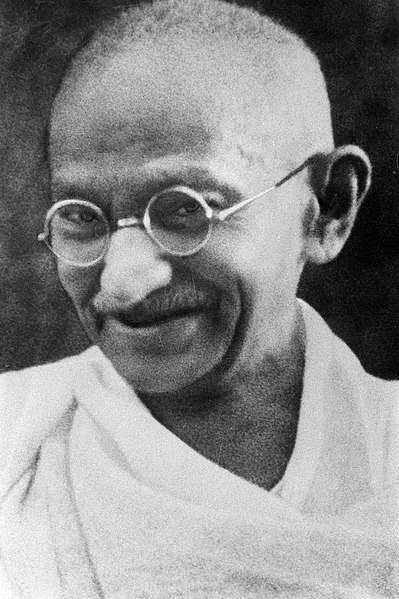Gandhi’s Guiding Light: Timeless Leadership Lessons for the Modern World

Embracing Gandhi’s Wisdom
In a world where leadership is often associated with power, control, and aggression, Mahatma Gandhi’s approach to leadership serves as a beacon of hope and inspiration. As a leader who pioneered nonviolent resistance to bring about social and political change, Gandhi’s life offers invaluable lessons for leaders across various domains. His principles and practices, rooted in empathy, truth, and self-discipline, have transcended time and geography, shaping the world in remarkable ways. This article aims to delve deep into the life and legacy of Mahatma Gandhi, drawing out essential leadership lessons that can enrich our personal and professional lives.
Born on October 2, 1869, in Porbandar, India, Mohandas Karamchand Gandhi, later known as Mahatma Gandhi, emerged as a seminal figure in the struggle for Indian independence from British rule. His philosophy of nonviolent resistance, known as Satyagraha, not only played a pivotal role in India’s quest for freedom but also left an indelible mark on the global political landscape. The impact of his approach to leadership can be seen in the works of civil rights icons like Martin Luther King Jr. and Nelson Mandela, both of whom acknowledged and embraced the principles of nonviolence to advance their respective causes.
At its core, the philosophy of nonviolent resistance is based on the belief that meaningful change can be achieved through non-aggressive means, emphasizing the power of truth, love, and moral integrity. Despite facing seemingly insurmountable odds, Gandhi’s unwavering commitment to these principles not only resulted in India’s independence but also inspired millions to view leadership in a new light. In an age marked by divisiveness, polarization, and violence, the relevance of Gandhi’s leadership lessons cannot be overstated.
In this article, we will explore various aspects of Mahatma Gandhi’s life, from his formative years and early experiences in South Africa to his return to India and his pivotal role in the Indian independence movement. Along the way, we will uncover critical leadership lessons that can be applied to various domains of life. By examining Gandhi’s approach to nonviolent resistance, personal discipline, empowering others, and conflict resolution, we aim to provide a comprehensive understanding of how his leadership style transcended conventional norms and left an enduring legacy.
As we embark on this journey through Gandhi’s life and the leadership lessons that can be drawn from it, it is crucial to remember that his philosophy of nonviolence was not only about abstaining from physical aggression but also about nurturing a spirit of love, truth, and understanding. In today’s fast-paced and competitive world, these principles can serve as guiding lights for leaders from all walks of life, inspiring us to create a more compassionate, just, and harmonious society.
Early Life and Formative Experiences
Mahatma Gandhi’s leadership journey can be traced back to his early life and the experiences that shaped his worldview. In this section, we will explore Gandhi’s upbringing and education, his time in South Africa, and the development of his philosophy of Satyagraha. These formative experiences laid the foundation for his remarkable leadership style, which continues to inspire and guide leaders across the globe.
Gandhi’s Upbringing and Education
Born into a modest family in the coastal town of Porbandar, India, Mohandas Karamchand Gandhi was the youngest of four siblings. His father, Karamchand Gandhi, served as the chief minister (diwan) of Porbandar, while his mother, Putlibai, was a deeply religious and compassionate woman who instilled in her son the values of truth, nonviolence, and self-discipline.
Gandhi’s early education took place in Porbandar and later in Rajkot. He was a shy and average student, showing no signs of the extraordinary leader he would become. However, the values imbibed from his family, particularly his mother, would go on to shape his life and leadership philosophy. At the age of 19, Gandhi traveled to England to study law at University College London. This period exposed him to different cultures and ideas, widening his perspective and setting the stage for his future role as a global leader.
Experiences in South Africa
In 1893, Gandhi accepted a position with an Indian firm in South Africa. It was during his time there that he first encountered the harsh realities of racial discrimination and social injustice. This experience would prove to be a turning point in his life, as it fueled his desire to fight against such injustices.
One pivotal event took place when Gandhi was thrown off a train in Pietermaritzburg, South Africa, for refusing to vacate a first-class compartment reserved for white passengers. This incident served as a catalyst, igniting his passion for social justice and planting the seeds of his unique approach to leadership.
During his 21 years in South Africa, Gandhi began to experiment with the principles of nonviolent resistance. He mobilized the Indian community to fight against racial prejudice and discriminatory laws, organizing peaceful protests, strikes, and negotiations. It was during this period that the concept of Satyagraha – a synthesis of the Sanskrit words for “truth” (satya) and “holding firmly” (agraha) – was born.
Development of Satyagraha
Satyagraha emerged as a powerful tool for social and political change, based on the principles of nonviolence, truth, and moral persuasion. Gandhi believed that by adhering to these values, one could resist and challenge unjust systems without resorting to violence. Satyagraha was not just a passive form of resistance; it required active engagement and commitment to the cause.
Gandhi’s experiences in South Africa allowed him to refine and hone his philosophy of Satyagraha, which would later play a central role in India’s struggle for independence. By the time he returned to India in 1915, Gandhi was already a well-known figure, and his leadership style had begun to take shape. His reputation as a fearless advocate for social justice and his unique approach to leadership earned him the respect and admiration of many, including leaders of the Indian National Congress.
In the next sections, we will delve deeper into Gandhi’s leadership journey, examining how his principles of nonviolent resistance, personal discipline, and commitment to truth shaped the course of history and continue to serve as valuable lessons for leaders today.
Nonviolent Resistance and Civil Disobedience
As Mahatma Gandhi’s leadership evolved, the principles of nonviolent resistance and civil disobedience became central to his approach. These concepts not only guided India’s struggle for independence but also influenced social and political movements across the globe. In this section, we will explore the foundations of nonviolence and civil disobedience, examine the historic Salt March, and draw out essential leadership lessons from Gandhi’s unwavering commitment to peaceful change.
The Principles of Nonviolence
At the heart of Gandhi’s leadership philosophy was the belief in the transformative power of nonviolence (ahimsa). Rooted in ancient Indian traditions and reinforced by his personal experiences, Gandhi saw nonviolence as both a means and an end, a guiding principle that could bring about lasting change in a deeply divided world.
For Gandhi, nonviolence was not merely the absence of physical violence but also a commitment to truth, love, and compassion. It required the cultivation of inner strength and moral courage, enabling individuals to resist injustice while maintaining dignity and self-respect. Through nonviolent resistance, Gandhi sought to foster dialogue, bridge divides, and ultimately achieve harmony and justice for all.
The Salt March (Dandi March)
One of the most iconic examples of Gandhi’s nonviolent resistance is the Salt March, also known as the Dandi March. This historic event demonstrated the power of peaceful protest and civil disobedience, serving as a turning point in India’s struggle for independence.
Background and Objectives
In 1930, the British government imposed a heavy tax on salt, a basic necessity for the Indian population. This tax further burdened the already impoverished masses and symbolized the broader injustices of British rule. To challenge this oppressive policy, Gandhi organized a 240-mile march from his Sabarmati Ashram to the coastal village of Dandi. His objective was to protest the salt tax by producing salt from seawater, an act that would deliberately defy the British monopoly on salt production.
The Impact on the Indian Independence Movement
The Salt March captured the imagination of millions, both in India and abroad. Over the course of 24 days, Gandhi and his followers traversed the countryside, gaining support and inspiring countless others to join the cause. By the time they reached Dandi, the march had swelled to thousands of participants, united by their commitment to nonviolent resistance and their shared desire for freedom.
The march culminated in a simple but powerful act: Gandhi stooped down and picked up a handful of salt, thereby breaking the British salt law. This act of civil disobedience sparked a wave of nationwide protests, with millions of Indians producing and selling salt in defiance of the colonial government. The Salt March demonstrated the power of nonviolent resistance, galvanizing the Indian independence movement and capturing the attention of the world.
Leadership Lessons from Nonviolent Resistance
Gandhi’s unwavering commitment to nonviolence and civil disobedience offers several key leadership lessons that are as relevant today as they were in his time:
-
Courage and Conviction: Great leaders possess the courage to stand up for their beliefs and the conviction to persevere in the face of adversity. Gandhi’s commitment to nonviolence required immense inner strength, resilience, and determination, qualities that are essential for effective leadership.
-
Patience and Perseverance: Nonviolent resistance is often a slow and arduous process, requiring patience and the ability to stay the course. Gandhi’s leadership demonstrated the importance of steadfast commitment to one’s goals, even when progress is slow or setbacks are encountered.
-
Building Bridges and Fostering Dialogue: Gandhi’s approach to nonviolence emphasized the importance of dialogue, understanding, and mutual respect. In a world marked by divisiveness, great leaders recognize the value of building bridges, fostering open communication, and seeking common ground.
-
Empathy and Compassion: Gandhi’s nonviolent resistance was grounded in empathy and compassion, both for those suffering from injustice and for those perpetrating it. Effective leaders understand the importance of empathizing with diverse perspectives, acknowledging the humanity of their adversaries, and finding solutions that benefit all parties.
-
The Power of Symbolism and Collective Action: The Salt March illustrates the importance of symbolism in leadership. Gandhi’s act of picking up a handful of salt was a powerful symbol that resonated with millions, inspiring them to join the struggle for independence. Great leaders recognize the value of symbolic gestures and the potential of collective action to bring about meaningful change.
-
Moral Authority and Leading by Example: Gandhi’s commitment to nonviolence and truth imbued him with a moral authority that inspired and mobilized others. As a leader, he consistently practiced what he preached, ensuring that his actions aligned with his values. This authenticity and integrity are essential qualities for leaders in any domain.
By embracing the principles of nonviolent resistance and civil disobedience, Mahatma Gandhi demonstrated that peaceful change is not only possible but also incredibly powerful. His leadership offers valuable lessons for those seeking to navigate the complex challenges of the 21st century, reminding us of the transformative potential of love, truth, and understanding.
Leading by Example: Gandhi’s Personal Life
Mahatma Gandhi’s leadership extended far beyond his political and social activism. His personal life, characterized by simplicity, self-discipline, and an unwavering commitment to truth, offers invaluable insights into the qualities and habits of a great leader. In this section, we will explore how Gandhi’s personal life informed his leadership style and extract key lessons that can be applied to various aspects of our lives.
Simple Living and Self-discipline
Gandhi firmly believed in the importance of simple living and minimizing material possessions. He dressed modestly, wore a simple loin cloth, and adhered to a strict vegetarian diet. This lifestyle reflected his belief that leaders should be relatable and accessible to those they serve, bridging the gap between the privileged and the underprivileged.
Gandhi’s simple living was closely tied to his commitment to self-discipline. He maintained a strict daily routine, which included waking up before dawn, engaging in meditation and prayer, and dedicating time to spinning cotton on a traditional charkha (spinning wheel). Through these daily practices, Gandhi cultivated inner strength and clarity of purpose, enabling him to remain focused and resilient in the face of adversity.
Emphasis on Truth and Integrity
Truth (satya) was a central tenet of Gandhi’s life and leadership. He believed that adherence to truth was essential for moral and spiritual growth, and he consistently strove to align his thoughts, words, and actions with this guiding principle. This commitment to truth and integrity earned Gandhi the respect and trust of millions, imbuing him with a moral authority that few leaders have achieved.
Life-long Learning and Self-improvement
Gandhi was a voracious reader and a firm believer in the importance of continuous learning and self-improvement. Throughout his life, he sought to expand his knowledge and understanding of diverse cultures, religions, and philosophies, drawing inspiration from a wide array of sources, including the Bhagavad Gita, the Bible, and the works of Tolstoy, Thoreau, and Ruskin.
This commitment to lifelong learning allowed Gandhi to adapt and evolve his leadership style, incorporating new ideas and perspectives into his philosophy. He was not afraid to acknowledge his mistakes and learn from them, exemplifying the humility and open-mindedness that are hallmarks of great leaders.
Leadership Lessons from Gandhi’s Personal Life
Gandhi’s personal life offers a wealth of leadership lessons that can enrich our personal and professional lives:
-
Authenticity and Humility: Gandhi’s simple lifestyle and commitment to truth reflected his authenticity and humility, qualities that enabled him to connect with people from all walks of life. Great leaders recognize the importance of staying true to their values and embracing their vulnerabilities, fostering genuine connections and trust.
-
Discipline and Focus: Gandhi’s self-discipline and daily practices provided him with the inner strength and focus necessary to navigate the challenges of leadership. By cultivating healthy habits and routines, leaders can enhance their resilience and maintain clarity of purpose.
-
Continuous Learning and Adaptability: Gandhi’s commitment to lifelong learning highlights the importance of staying curious, open-minded, and adaptable. Great leaders recognize that they do not have all the answers and are willing to learn from diverse sources and perspectives, enabling them to grow and evolve in response to new challenges and opportunities.
-
Moral Courage and Ethical Leadership: Gandhi’s unwavering commitment to truth and integrity set a powerful example of ethical leadership. By embracing these values and leading with moral courage, leaders can inspire trust, loyalty, and lasting change.
Gandhi’s personal life serves as a powerful reminder that great leadership is not solely about external accomplishments but also about the cultivation of inner strength, wisdom, and compassion. By embodying these qualities and applying the lessons gleaned from Gandhi’s personal life, leaders can navigate the complexities of the modern world with grace, humility, and moral authority, fostering a more just and compassionate society for all.
Empowering and Inspiring Others
Mahatma Gandhi’s leadership extended far beyond his time, inspiring and empowering countless individuals to take up the mantle of change and fight for social justice. His ability to mobilize diverse groups of people, foster empathy and understanding, and lead by example has had a lasting impact on the world, shaping the lives and philosophies of leaders like Martin Luther King Jr. and Nelson Mandela. In this section, we will explore the ways in which Gandhi empowered and inspired others, and draw out essential leadership lessons from his legacy.
Influence on leaders like Martin Luther King Jr. and Nelson Mandela
Gandhi’s approach to nonviolent resistance and civil disobedience had a profound influence on leaders like Martin Luther King Jr. and Nelson Mandela. Both leaders drew inspiration from Gandhi’s teachings and adapted his methods to their respective struggles for civil rights and racial equality.
Martin Luther King Jr. studied Gandhi’s philosophy and techniques during his visit to India in 1959, which ultimately shaped his leadership in the American Civil Rights Movement. By employing nonviolent resistance and civil disobedience, King successfully challenged racial segregation and discrimination in the United States, paving the way for the Civil Rights Act of 1964 and the Voting Rights Act of 1965.
Similarly, Nelson Mandela admired Gandhi’s dedication to nonviolence and his ability to unite diverse groups of people for a common cause. Mandela applied these principles during his long struggle against apartheid in South Africa, leading to the dismantling of the oppressive system and the establishment of a democratic, multiracial South Africa.
Mobilizing diverse groups of people
Gandhi’s leadership was characterized by his ability to mobilize people from various social, economic, and religious backgrounds, transcending barriers to unite them in a shared struggle for justice and equality. He skillfully employed symbolism and evocative messaging to communicate with the masses, appealing to their emotions and shared experiences.
By engaging people from all walks of life and empowering them to take part in the fight for independence, Gandhi demonstrated the importance of inclusiveness, solidarity, and collective action in achieving social and political change.
The importance of empathy and understanding
Empathy and understanding were central to Gandhi’s leadership style. He believed in the power of dialogue and active listening, striving to understand the perspectives and needs of others, even those who opposed him. This empathic approach enabled him to build bridges between communities and foster a sense of unity and common purpose.
Gandhi’s emphasis on empathy and understanding highlights the critical role these qualities play in effective leadership, helping to create an environment where diverse perspectives are valued, and collaboration is encouraged.
Leadership lessons from empowering and inspiring others
Gandhi’s legacy of empowering and inspiring others offers several key leadership lessons:
-
Leading by example: Gandhi’s dedication to his principles and his commitment to leading by example inspired countless individuals to follow in his footsteps. Great leaders understand the power of their actions and strive to embody the values they wish to see in others.
-
Inclusiveness and solidarity: Gandhi’s ability to mobilize diverse groups of people underscores the importance of inclusiveness and solidarity in leadership. By fostering a sense of belonging and shared purpose, leaders can tap into the collective strength and resilience of their teams.
-
Active listening and empathy: Gandhi’s emphasis on empathy and understanding highlights the need for leaders to cultivate these skills, enabling them to build trust, foster collaboration, and navigate conflict more effectively.
-
Adaptability and innovation: Gandhi’s influence on leaders like Martin Luther King Jr. and Nelson Mandela demonstrates the importance of adaptability and innovation in leadership. Great leaders are not afraid to learn from others, embracing new ideas and strategies to achieve their goals.
By empowering and inspiring others, Mahatma Gandhi left an indelible mark on the world and shaped the course of history. His legacy serves as a powerful reminder of the transformative potential of compassionate, principled leadership and the power of individuals to bring about lasting change.
The life and leadership of Mahatma Gandhi offer invaluable lessons for those seeking to navigate the complex challenges of our time. His unwavering commitment to nonviolence, his dedication to truth and simplicity, his emphasis on empathy and understanding, and his ability to inspire and empower others continue to resonate with leaders across the globe.
By embracing the principles and practices exemplified by Gandhi, we can cultivate a more compassionate, just, and sustainable world, united by a shared commitment to the well-being and dignity of all people.
Navigating Conflict and Negotiation
Mahatma Gandhi’s leadership was marked by his ability to navigate complex conflicts and negotiations, both within the Indian independence movement and in interactions with the British colonial government. In this section, we will examine Gandhi’s role in the Round Table Conferences, explore his strategies for conflict resolution and negotiation, and derive essential leadership lessons from his experiences.
Gandhi’s role in the Round Table Conferences
The Round Table Conferences were a series of negotiations between the British government and Indian leaders, held in London between 1930 and 1932. These conferences aimed to discuss the future of India and the potential for constitutional reforms that would eventually pave the way for independence.
Gandhi played a crucial role in these negotiations, representing the Indian National Congress (INC) and advocating for the rights and aspirations of the Indian people. Although the conferences ultimately failed to reach a consensus on the most contentious issues, Gandhi’s participation demonstrated his commitment to dialogue and his willingness to engage with opponents in a constructive manner.
Strategies for conflict resolution and negotiation
Gandhi’s approach to conflict resolution and negotiation was rooted in his commitment to nonviolence, truth, and understanding. Some key strategies employed by Gandhi included:
-
Active listening: Gandhi believed that listening was as important as speaking in the negotiation process. By actively listening to his opponents and understanding their perspectives, he was better equipped to address their concerns and find common ground.
-
Empathy and compassion: Gandhi’s emphasis on empathy and compassion allowed him to humanize his opponents and foster a sense of shared humanity. This approach helped to defuse tensions and create an atmosphere conducive to constructive dialogue.
-
Flexibility and adaptability: Gandhi understood that compromise was often necessary to achieve progress in negotiations. He was willing to be flexible and adapt his position when needed, without compromising his core principles.
-
Persistence and patience: Gandhi was aware that conflict resolution and negotiation could be a slow and challenging process. He remained patient and persistent, recognizing that progress often required time and perseverance.
Leadership lessons from navigating conflict and negotiation
Gandhi’s experiences in navigating conflict and negotiation offer several important leadership lessons:
-
The power of dialogue: Gandhi’s willingness to engage in dialogue with his opponents, even in the most challenging circumstances, underscores the importance of open communication and constructive engagement in conflict resolution.
-
Emotional intelligence: Gandhi’s ability to empathize with others and understand their emotions highlights the critical role of emotional intelligence in leadership. Leaders who can recognize and manage their own emotions, as well as those of others, are better equipped to navigate conflict and build strong relationships.
-
Strategic thinking: Gandhi’s negotiation strategies demonstrate the importance of strategic thinking in leadership. By carefully considering his opponents’ perspectives and crafting his arguments accordingly, he was able to maximize the chances of a successful outcome.
-
Resilience and determination: Gandhi’s persistence and patience in the face of setbacks and challenges serve as a powerful reminder of the importance of resilience and determination in leadership. Great leaders remain steadfast in their pursuit of their goals, even when the path forward is difficult or uncertain.
By examining Mahatma Gandhi’s approach to conflict resolution and negotiation, we can glean valuable insights into the qualities and skills required for effective leadership in the face of adversity. Embracing the principles of nonviolence, truth, and empathy, leaders can foster constructive dialogue, build trust, and ultimately achieve lasting change.
The Legacy of Mahatma Gandhi
The leadership of Mahatma Gandhi has had a profound and lasting impact on the world, shaping the course of history and inspiring generations of leaders to follow in his footsteps. In this section, we will explore the consequences of Gandhi’s leadership in Indian independence and the Partition, the lasting influence of his principles, and the universal applicability of his leadership lessons.
Indian independence and the Partition
Gandhi’s tireless efforts to achieve Indian independence culminated in the British government’s decision to grant India its freedom in 1947. His advocacy for nonviolent resistance and civil disobedience played a pivotal role in mobilizing the Indian people and compelling the British authorities to relinquish control.
However, the joy of independence was marred by the tragic Partition of India, which resulted in the division of the country into two separate nations—India and Pakistan. The partition led to widespread violence and the displacement of millions of people, deeply affecting Gandhi, who dedicated his final days to promoting peace and reconciliation between the two new nations.
The lasting impact of Gandhi’s principles
Gandhi’s principles of nonviolence, truth, and social justice continue to inspire and influence movements for peace and human rights around the world. His teachings have been adopted and adapted by leaders such as Martin Luther King Jr., Nelson Mandela, and Aung San Suu Kyi, who have each applied these principles to their respective struggles for justice and equality.
In addition to the broader impact of his principles, Gandhi’s emphasis on self-improvement, humility, and personal responsibility has left a lasting impression on countless individuals, challenging them to lead by example and strive for a better world.
The universality of Gandhi’s leadership lessons
The leadership lessons derived from Mahatma Gandhi’s life and work are universally applicable, transcending cultural, social, and political boundaries. Key lessons, such as the importance of leading by example, the value of empathy and understanding, and the power of persistence and determination, can be applied across a wide range of contexts, from personal development to organizational leadership and beyond.
In an increasingly interconnected and complex world, the lessons gleaned from Gandhi’s leadership serve as a powerful reminder of the transformative potential of principled, compassionate leadership. By embracing these principles and striving to embody the qualities exemplified by Mahatma Gandhi, leaders in all domains can foster a more just, inclusive, and harmonious world.
The legacy of Mahatma Gandhi stands as a testament to the enduring power of love, truth, and nonviolence. His leadership continues to inspire and challenge us, offering valuable insights into the qualities and skills required to navigate the complexities of the 21st century. As we continue to grapple with issues of social justice, political unrest, and environmental sustainability, the lessons of Gandhi’s leadership remain as relevant and vital as ever.
The Timeless Relevance of Gandhi’s Leadership
As we conclude our exploration of Mahatma Gandhi’s leadership lessons and stories, it is clear that his influence reaches far beyond the confines of his time and place. His unwavering commitment to nonviolence, his dedication to truth and simplicity, his ability to empower and inspire others, and his skill in navigating conflict and negotiation have left an indelible mark on the world, shaping the lives of leaders and ordinary people alike.
The timeless relevance of Gandhi’s leadership principles lies in their universal applicability, transcending cultural, social, and political boundaries. His teachings continue to resonate in today’s increasingly interconnected and complex world, offering invaluable insights into the qualities and skills required to navigate the challenges of our time.
In the face of ongoing struggles for social justice, political stability, and environmental sustainability, the lessons gleaned from Gandhi’s leadership serve as a powerful reminder of the transformative potential of principled, compassionate leadership. By embracing these principles and striving to embody the qualities exemplified by Mahatma Gandhi, leaders from all walks of life can foster a more just, inclusive, and harmonious world.
As we reflect on the life and work of Mahatma Gandhi, we are reminded of the power of individuals to bring about lasting change. Gandhi’s leadership demonstrates that even in the face of seemingly insurmountable obstacles, it is possible to make a difference and leave a lasting impact on the world.
By internalizing the lessons of Gandhi’s leadership and applying them to our own lives, we can each contribute to the creation of a more compassionate, just, and sustainable world. In this way, the legacy of Mahatma Gandhi lives on, inspiring and challenging us to become the change we wish to see in the world.






